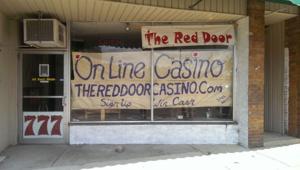Ohio AG Raids Hocking Co. Casino, Owner Claims Sovereignty
- Published in Notoweega News
LOGAN, Ohio - An alleged illegal casino was closed in Hocking County Friday.
By: Denise Yost, Multimedia Content Manager - This email address is being protected from spambots. You need JavaScript enabled to view it.
Agents with the Ohio Attorney General's Office served a search warrant at the Red Door Casino at 44 E. Main St. in Logan Friday afternoon.
Agents removed gaming machines from the business.
"The people that do go in there and gamble it's nothing major maybe $5 here, $10 dollars there," said Logan Resident Jacob Keister looking on.
The search warrant was served as part of an ongoing investigation regarding allegations of illegal gambling at the location.
The owner claims the raid isn't your typical raid on a suspected illegal gambling joint.
"This is in retaliation for operating as a tribal people," said Marshall Lucas who goes by the name Dancing Elk. He tells NBC4's Denise Alex that he is a member of the Notweega nation.
That's where the raid, where computers, televisions, gaming machines and cash that were seized, gets more interesting.
Ohio BCI agents and member of the Ohio Investigative Unit spent about 4 hours seizing items from the Red Door on East Main Street in downtown Logan. The business owner says he is being unfairly targeted because he's a member of the sovereign nation.
"They have no right to enter our property. This is sovereign property. We are non-reservation Indians. We are operating a sovereign business," added Dancing Elk.
He says the Notweega nation is a Native American tribe that governs itself.
Ohio BCI agents say the Logan native is breaking the law.
"There's several different variables that actually makes it illegal but some of the cash pay outs and some of the things they were doing, allegedly going on are suspected at this establishment," said Special Agent Supervisor Scott Fitch.
Tribal members say they are misunderstood.
"Insult to injury would be the best to describe the scenario right now," said Karmelita Plains Bull.
"They are stealing our property, the are destroying our property. We've been dealing with this for over 5 years now," said Dancing Elk.
Dancing Elk took NBC4's Denise Alex inside the Red Door after police cleared the scene.
Newspaper articles taped to the wall tell the Red Door's battle to stay open for business.
Dancing Elk claims to be harassed for years by many Logan city leaders and has $20 million dollar lawsuit against them pending in federal court.
No arrests were made in Friday's raid, but officials said charitable law prosecutors with the Ohio Attorney General's Office will decide on charges.
will decide on charges.



